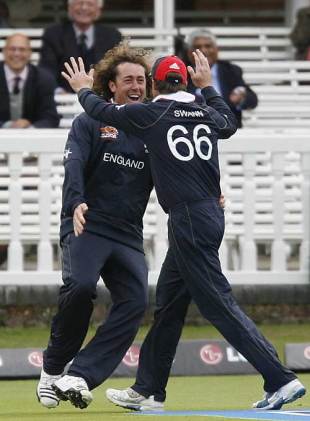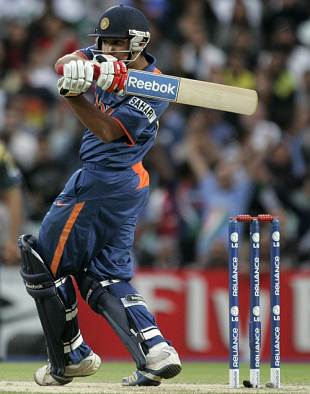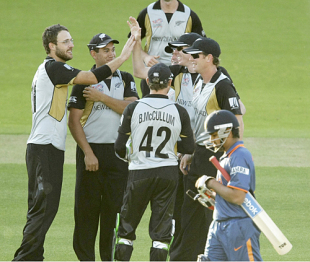
Match facts
Friday June 5Start time 17.30 (16.30GMT)
Big Picture
The floodlights are in place, the snoozing MCC members have been piled up in a quiet corner, and after a soporific start to the summer, we are all set to get England's biggest-ever season of international cricket properly underway. The endless encounters with West Indies may been a drain on the patience of even the game's most stalwart fans, but the prospect of a major global tournament on home soil will lift the spirits as much as the glorious sunshine of the week just past.The Netherlands are not the most formidable opponents that England will face this summer, but as Scotland demonstrated in a feisty friendly at Trent Bridge on Tuesday, 20-over contests play into the hands of ambitious underdogs. A couple of big performances are all that any team needs, and the Dutch have a squad with two kingpins in Dirk Nannes and Ryan ten Doeschate, as well as a glut of senior players with experience of two (and in one case, three) World Cups. They are no strangers to the big-match atmosphere.
England for their part just need a solid start. They come into the contest with a run of six victories in a row in all matches since the Lord's Test in May, but need to maintain that momentum if they are outdo their efforts in the 2007 event, when they bombed out of the contest with four defeats in a row.
Form guide
England LWWWLNetherlands NWLW
Watch out for...
Chopping and changing between formats holds no fears for Ravi Bopara. From the IPL to the Test arena, through a one-day series against West Indies and now back to Twenty20 cricket, he has shown that a run of good form can be sustained with a positive attitude and barrow-loads of confidence. Back at Lord's, where he scored the second of his three consecutive Test hundreds, and reunited with the format in which he bashed 84 from 59 for King's XI Punjab, he can be guaranteed to open England's tournament with cultured aggression.
Associate nations cannot usually call upon express pacemen to aid their ambitions, but Dirk Nannes is a player with the skills to uproot a few early wickets. He knows the Lord's wicket well, having played here for Middlesex in 2008, and his speedy late-swinging left-armers will doubtless be exacerbated by the slope. With only four overs to make an impact, England would be wise to treat him with caution. But if he can create pressure from one end, his colleagues have the wherewithal to capitalise at the other.
Team news
England are set to use their 12th opening partnership in 16 Twenty20s when Luke Wright teams up with Bopara at the top of the order, having cemented his place with a matchwinning 75 not out against West Indies on Wednesday. Adil Rashid played in both warm-ups but is likely to miss out as the second spinner, as is Dimitri Mascarenhas who had been used as a new-ball option at Trent Bridge.
England (probable) 1 Luke Wright, 2 Ravi Bopara, 3 Kevin Pietersen, 4 Owais Shah, 5 Paul Collingwood (capt), 6 Eoin Morgan, 7 James Foster (wk), 8 Stuart Broad, 9 Graeme Swann, 10 Ryan Sidebottom, 11 James Anderson
The hard-hitting Darron Reekers is likely to open up with Alex Kervezee, whose 62 from 59 balls saw off Scotland earlier in the week. Daan van Bunge, famous as the man who was hit for six sixes in an over by Herschelle Gibbs, slots in in the middle order. ten Doeschate, the Essex allrounder, is the kingpin of the middle order.
Netherlands (probable) 1 Darron Reekers, 2 Alexei Kervezee, 3 Bas Zuiderent, 4 Ryan ten Doeschate, 5 Daan van Bunge, 6 Jeroen Smits (capt), 7 Tom de Groothe, 8 Mudassar Bukhari, 9 Dirk Nannes, 10 Edgar Schiferli, 11 Pieter Seelaar
Pitch and conditions
The weather, so glorious all week, is set to give way to light showers, which will test the teams under the new Lord's floodlights. The legendary outfield, however, won't have any trouble coping if there is a downpour. The pitch has been slow for recent encounters, but expect another decent batting surface.
Stats and Trivia
- England have faced Netherlands in two previous ICC tournaments, firstly in Peshawar, where they won by 49 runs at the 1996 World Cup, and then in East London in 2003, when the margin was six wickets.
- Five players in the current squads featured in the 2003 fixture. One from England (James Anderson, who claimed 4 for 25) and four from Netherlands - Jeroen Smits, Edgar Schiferli and van Bunge, as well as Bas Zuiderent, who even played in the Peshawar match, scoring 54 to keep the run-chase alive.
Quotes
"It is a big commitment but we love the game, we don't make a living out of it. Maybe if we do well in these kind of tournaments we will."
Jeroen Smits admits that the life of the Dutch international cricketer is not all glamour.
"We believe we can win it. I'm not saying we will win it because I don't want to put pressure on the boys by saying we'll win it."
Paul Collingwood doesn't quite hedge his bets.










